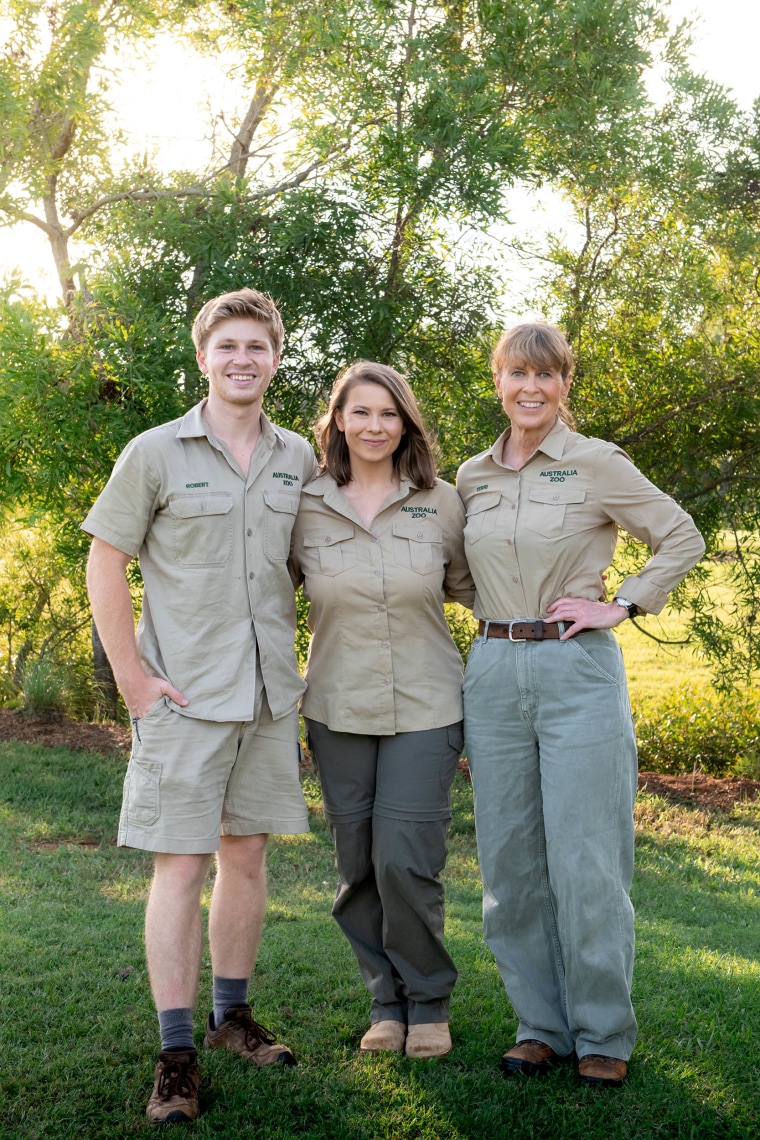When Bindi Irwin first began menstruating, she noticed “intense” symptoms that occurred with her periods. As she aged, they became more severe, she recalls.
The 25-year-old daughter of Steve Irwin, aka the Crocodile Hunter, started to experience nausea, irritable bowel syndrome, severe stabbing pain, cramping and fatigue almost every day — and when she got her period, she'd feel even worse.
Irwin often told her doctors about these symptoms, but test after test came back normal. Still, she continued to wonder why she felt the way she did.
“It was getting more and more concerning as to what the real problem was and if we would ever find the cause,” she tells TODAY.com via email. “Doctors would chalk it up to hormones and being a young woman, and I was often told that it was just the stress of life, and I should work on my mental health.”
Being dismissed and “told it was in (her) head” harmed her wellbeing.

“This was incredibly disheartening and actually caused me a lot of anxiety and depression as I was constantly in pain with no answers for what was wrong with me,” Irwin says. “It was very easy to believe doctors, and I actually gave up searching for answers.”
As her symptoms intensified, Irwin changed how she lived her life, shying away from activities she enjoyed, such as hiking, exercising and even being close with friends and family.
“For years, hugs hurt because my body was in excruciating pain every day,” she says. “I found that my pain took away my sense of humor and joy. It hurt to laugh.”
After giving birth to her daughter, Grace Warrior Irwin Powell in 2021, Irwin’s symptoms became “overwhelming,” she says, and she returned to her search for answers. Then, a friend of hers, Leslie Mosier, owner of Doug the Pug, posted on social media about having endometriosis.
Endometriosis is a condition where tissue similar to the lining of the uterus grows in the pelvis and other places throughout the body, causing pain, gastrointestinal troubles, heavy periods and other symptoms, which can occur with or without menstruation.
Irwin recognized her experience in Mosier’s story.
“Her description of her endometriosis pain matched my symptoms so well that I reached out to her,” Irwin says. “It’s unbelievable to me that I hadn’t heard of endometriosis before even though I had been with it for a large portion of my life.”
Endometriosis and its treatment
Endometriosis impacts 11% of women between ages 15 to 44, according to the U.S. Department of Health & Human Services. But Dr. Tamer Seckin, co-founder of the Endometriosis Foundation of America and one of the few surgeons to perform minimally invasive surgery for endometriosis, suspects it affects more people than that.
That's because some people are asymptomatic and never learn they have it, and others have symptoms that go undiagnosed, he says.
“There is no blood, test and there is no imaging for the part of endometriosis that is the most common,” Seckin, author of “EndoMetriosis: A Guide for Girls,” tells TODAY.com. “Definite diagnosis can only be made by visually detecting (the endometriosis in surgery) and examining under a microscope.”
Common endometriosis symptoms include:
- Pain with menstruation
- Heavy bleeding
- Painful bowel movements
- Vomiting
- Bloating or endo belly
- Infertility
- Pain during sex
Some patients have described their endometriosis symptoms to Seckin as "incapacitating (and) horrific," he says. "Some people even say it’s like a bag of nails is dragged out of my vagina.”
While the pain starts when one begins menstruating, some patients experience pain for longer periods throughout the month. While many people have gastrointestinal symptoms, Seckin says if they worsen during menstruation, it can be a sign of endometriosis.
“The patient says, ‘I have gas, bloating and I cannot tolerate foods, painful bowel movements at times, vomiting,’ and you’ve got to ask that magic question … ‘When does this become more pronounced,’” he says. “Of course, during the period.”
The gold standard for treatment for endometriosis is called excision, when doctors cut out the endometriosis tissue, also known as lesions, nodules or cysts. But most doctors are not trained to perform it.
Surgery, recovery and raising awareness
After reaching out to Mosier, Irwin was connected with Seckin for a consultation about her symptoms. After years of being dismissed, she felt reassured by talking to him.
“I had no idea if I truly had endometriosis since nothing showed up on blood tests or scans. Unfortunately, this is the same for a lot of people, and endometriosis often goes undiagnosed,” Irwin says. “It wasn’t until I spoke with Dr. Seckin that I felt quite confident that endometriosis was what I was dealing with.”
She felt touched when he spoke to her about living with pain and “kindly suggested excision surgery,” which she traveled to the United States to receive.
“I had no idea what we would find,” she says. “I was terrified that he wouldn’t find anything, and I’d sink back into my fear of not knowing what was wrong with me.”
On March 3, 2023, Irwin underwent excision surgery with Seckin. When she woke, she learned what caused her pain and symptoms.
“Dr. Seckin told me that he could confirm that I had endometriosis and removed it all,” she says. “It was one of the most validating experiences of my life.”
Seckin removed more than 30 lesions and one cyst filled with menstrual blood, also called an endometrioma. The cyst contributed “a large portion of my stabbing pain," Irwin explains.
“I could feel the difference from the moment I woke up,” she recalls. “I will never forget when Dr. Seckin asked me, ‘How have you been living in this much pain?’”
One of the hardest parts of recovery was reminding herself to “take it easy,” a challenge for any parent.

“I was always running after our 2-year-old daughter,” she says. “One of the hardest things (was) not being able to pick Grace up for six weeks after surgery. She would ask me all the time, ‘Mama, please pick me up?’ I felt so bad. However, every week, I saw improvement in my health.”
The support of her family helped Irwin heal, and she feels grateful that surgery has allowed her to enjoy life and parenting even more.
“I’m able to give Grace every inch of my attention. My pain is no longer in the driver’s seat,” she says. “It feels so good to be able to genuinely play and run around with her.”
Recently, she has been able to do cardio and weight lifting, something she couldn’t do when her symptoms at their worst. Irwin also looks forward to hiking again — she last hiked in 2019 — and more fully engaging in wildlife conservation work.
At first, Irwin felt wary about sharing her story, but really wanted to help others.
“I didn’t know how everyone would react and if I was ready to share the most vulnerable part of myself,” she says. “I am so thankful that I have been able to talk about my journey and hopefully help others seek real, genuine help.”
Irwin wants to raise awareness that severe pain with menstruation is not normal and people should seek help if they experience it.
“Many women find that they’re dismissed when expressing their pain, especially with periods. There’s certainly a stigma surrounding a woman’s ‘time of the month,’” she says. “It is devastating to me how many people, including myself, feel like they can’t get the answers and the help that is deserved because of people normalizing severe period pain.”
For her efforts in increasing awareness of endometriosis, she will receive the Blossom Award during the the Endometriosis Foundation of America’s Blossom Ball on May 3, 2024.
“It is a tremendous honor to be recognized,” she says. “I am dedicating this incredibly kind recognition to everyone who has spent years feeling dismissed, unseen and undiagnosed.”
Since revealing her diagnosis, she has heard from many others grappling with health challenges, and she hopes they feel encouraged to “push forward for the answers (they) deserve.” With sharing her story, Irwin wants people to realize they are not alone.
“Endometriosis can feel like a very isolating disease. Outside of my mum, brother and husband, no one knew the pain I was experiencing on a daily basis,” she says. “I didn’t want people to know I was having problems out of fear for how they might view me. I feared that maybe the doctors were right, and it was all in my head. Now I know it’s OK to be vulnerable and it’s OK if you don’t have all the answers.”